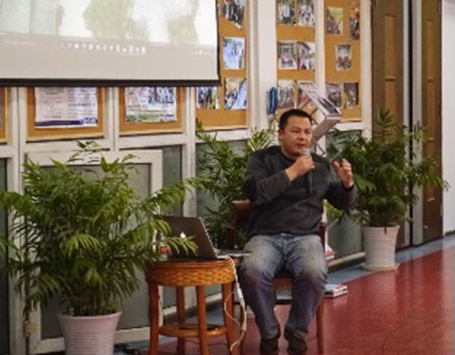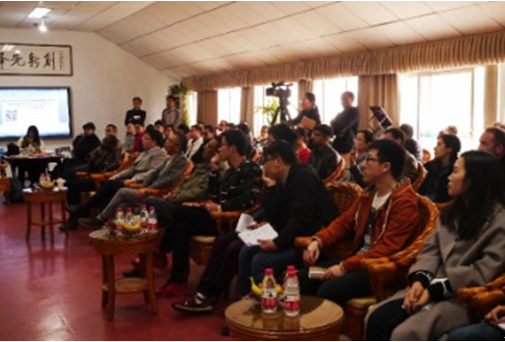Since its inception in 2009, GeoScience Café as an academic exchange platform, has brought together hundreds of teachers, students and science enthusiasts as special guests to address a wide range of topics related to research and personal experience. Many students have benefitted from this noble initiative. Earlier this year, Secretary Yang Xu proposed the expansion of GeoCafé by introducing its English version. The framework of the English GeoScience Café was designed to attract foreign students from around the world to pitch ideas and brainstorm on those ideas with the brightest minds on campus. The GeoScience Café is a gathering of optimists who can see through challenges in the field of remote sensing and surveying.

Prof. Huang Xianfeng presenting the lecture
On 10th March, the very first edition of the English GeoCafé invited a renowned scholar and professor from LIESMARS (State Key Laboratory of Information Engineering in Surveying, Mapping and Remote Sensing), Dr. Huang Xianfeng to present a lecture on “Applications of Laser Scanning and Oblique Imagery for High Precision 3D Modeling” at the Leisure Hall in LIESMARS. Prof. Huang serves as a visiting researcher at Microsoft Research Asia and has made noteworthy contributions in the field of laser scanning, data processing, photogrammetry and digital cultural heritage. During the presentation, he discussed the application of photorealistic 3D modelling in cultural heritage preservation.
The event kicked off with the opening speech from Director Chen Ruizhi of LIESMARS. During his speech, Chen expressed his hope for this English-speaking platform to attract foreign students to participate in such extra-curricular activities. Then, Prof. Huang Xianfeng spoke about the project led by his team to create 3D models of the Dunhuang Mogao Grottoes in the Gobi Desert and Kizil Caves in Xinjiang using modern sensing and surveying equipment like Airborne LiDAR, terrestrial laser scanner and stereo cameras. There are countless cultural heritage sites stretched across the globe that are in need of restoration so scholars like Prof. Huang Xianfeng have a pivotal role to play. They used several of the latest techniques like ICP, global optimization method, texture mapping, real–time mapping and seam processing to collect, integrate and augment data, and they even made breakthrough in correcting anomalies generated from intensity distribution. He also informed everyone about his geospatial company Daspatial which deals with 3D modeling and surveillance systems.
Apart from cutting and cauterizing, laser technology also has numerous applications in digital archeology, medicine, manufacturing and military defense. It has always been perceived as cutting-edge technology and the advancements scientists achieve in this field are always significant. In the last few years, drastic shifts in the technological domain have transformed the way humans work, and laser technology has played a crucial role in it.

Audience listening to the lecture
Events like GeoScience Café aims at incentivizing other scholars to share their valuable research experience and knowledge with instant feedback from the audience. The idea of holding GeoScience Café is clearly a wise one for it not only helps foster collaborative learning, but also deepens students’ understanding of academic research and subjects, promoting better social interaction between students and professors in a relaxing setting.
Photo by Chen Ziyao, edited by Wu Siying, Edmund Wai Man Lai & Hu Sijia